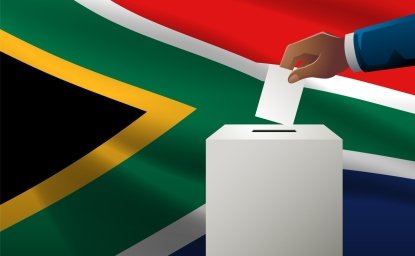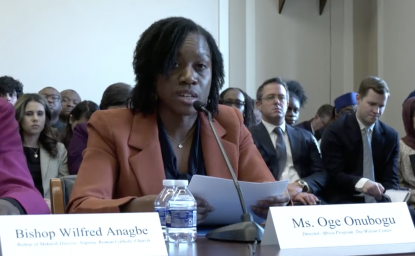Ann Hudock had never been to Africa before spending a year in Sierra Leone working for an indigenous agricultural NGO. This gave her the chance to learn a great deal about the relationship between African NGOs and their counterparts in the developed world. She later returned to Sierra Leone to conduct extensive field work and research on the role of NGOs in development, which served as the basis of her recently published work NGOs and Civil Society: Democracy by Proxy?
As it turned out, what Hudock encountered in Sierra Leone was an example of how NGOs in the Southern Hemisphere can become corrupted by outside influence and infusions of capital. To date, most Southern NGOs (those in developing countries) depend on Northern NGOs (those in developed countries) for resources. As a result, Northern NGOs tend to dictate the agendas of Southern NGOs, which sometimes undermines their credibility within their local communities as well as limiting their ability to effect change.
Based on her firsthand experience in Sierra Leone as well as some case studies of NGOs in neighboring Gambia, Hudock has written a book arguing the need for strengthening NGOs in Africa and other parts of the Southern Hemisphere -- to the point of being able to contribute significantly to the development of civil society at the level of the local community. The book is provocatively subtitled: "Democracy by Proxy?"
Program assistant Andrea Bertone took advantage of Hudock's appearance at the Wilson Center in early March to ask her some questions about the year she spent in Sierra Leone and the observations that led to the writing of her book.BERTONE: It must be unusual for an American woman to spend a year working in an African NGO. Which NGO did you work for, and how did the whole thing come about?
HUDOCK: I was with the Association for Rural Development, called ARD, in Sierra Leone. I was there for a year as project assistant.
BERTONE: How did you get that job?
HUDOCK: While I was an undergraduate at the University of Dayton, a series of connections brought the university in contact with Sierra Leoneans. Congressman Tony Hall, who is very active on hunger issues, took a personal interest in Sierra Leone and asked Brother Raymond Fitz, president of the University of Dayton, if there was a way that the university students could get involved in Sierra Leone. At the request of Brother Fitz, a group of students went over to Sierra Leone to assess what kinds of projects could be done to foster greater cooperation between the university and Sierra Leone. I graduated from the University of Dayton and went to Sierra Leone for a year to work with ARD. I went around to communities and helped them with writing proposals to donors and Northern NGOs to address agricultural problems.
BERTONE: Your book explores how the mission of NGOs in Western Africa can become corrupted by outside influence and infusion of capital from Northern NGOs and foreign donors. Was that based on your observations of what happened at ARD?
HUDOCK: Yes, there were several times during my tenure when ARD was subject to outside control and donors were driving the process. One was a water project that ARD was trying to implement along with a Northern NGO. This Northern NGO wanted to build a well in the community. The next question was, well, where do we sink the well? There were several sites that were good for this technically, and then it was decided that the well would be put in front of the village chief's house. The chief would be able to keep an eye on the well, and he could make sure that animals kept away from it. As it turns out, no one used it.
You see, all water collection is a woman's job in Africa and when women collect the water they are actually doing more than that. They are talking about their problems, childcare, and so on. They would not collect water in front of the chief's house because he would hear them talking privately. Therefore, the well went untouched, and the money and efforts were wasted. The Northern NGO simply decided to build a well and did not find out the cultural implications.
BERTONE: So it was the Northern NGO that decided where the well would be placed, without consulting ARD or the community?
HUDOCK: ARD told the Northern NGO that they needed to put this well somewhere where the women could carry on their conversations. It is very important that women have their time to discuss their concerns; this interaction maintains the social fabric of the community. ARD did alert the Northern NGO but to no avail. Normally, Northern NGOs would seek out the advice of Southern NGOs about these things.
Another classic example was a latrine project. The latrine project should not have been done unless it was completely respectful of the culture, unless there were completely separate latrines. You can't just have separate entrances, they had to be completely separate structures. The community was predominantly Muslim; they most certainly would not mix to use the latrine. But the Northern NGO insisted that the latrines be built together and so no one used them.
BERTONE: What kind of people work at ARD?
HUDOCK: Sierra Leoneans. Largely they are educated, elite, dynamic people. Quite often they will be criticized because they can speak English. The fact that they do speak English is important to donors. But does that mean they are connected to communities? You need a leader that can operate in two worlds without losing a foot in one, and maintain the priorities with the communities.
BERTONE: So do you see the miscommunications you've described as the fault of ARD or the Northern NGO?
HUDOCK: Having sat in ARD for a year, I saw how ARD pushed its agenda with the Northern NGO by telling them exactly how it thought the money would best be used. Donors were very reluctant to give up control to a Southern NGO like ARD because Northern NGOs have their own pressures that they must respond to, like government funding. Northern NGOs attach conditions to southern NGOs because they also have to account to donors. There are very few Northern NGOs that have untied pool of funds.
BERTONE: Those were two great examples that you gave about the disconnect between ARD and Northern NGOs. In hindsight, one could ask why they would waste time and money doing a project that would not benefit the community. Furthermore, it breaks the trust that the community might have with ARD.
HUDOCK: Exactly. Bread for the World-Germany decided to give ARD a small fund that ARD could disperse as it saw fit. It was untied money. There can be a problem with an approach like that because the money does not always come to the community at the right time. If, for example, the money is not coordinated with the agricultural calendar -- when resources are for small-scale agricultural development -- it can be of little use. But it is definitely a step in the right direction to give up control of money to an NGO.
BERTONE: So is ARD's experience typical of a West African NGO?
HUDOCK: There are, I am sure, exceptions to this model of West African NGOs -- Nigeria, for example. Nigeria's NGO sector has been particularly powerful in terms of challenging the establishment -- particularly human rights NGOs when challenging Nigeria's previous government. There are networks of NGOs that USAID has supported in Nigeria that started out as community health and maternal/child healthcare NGOs. As the opportunities opened up, Nigerian NGOs became more involved in elections, supporting political candidates and highlighting how they would address women's issues. This is an important evolution of the NGO sector. NGOs connected to community can make more of a difference.
But I think most West African NGOs can be characterized in the way that I describe the cases in Sierra Leone and the Gambia in my book: they are resource dependent and are driven by donor agendas. These NGOs rely on the resources given to them, but are often disconnected from the communities and local economies with which they are working.
BERTONE: Could I ask you to elaborate on one more point: How does the relationship between the Southern and Northern NGOs differ from a relationship between a Southern NGO and a donor?
HUDOCK: They often play the same role: they are providing resources. Sometimes the Northern NGOs, even though they see a lot of money from governments, have fewer restrictions on how they can use money. Whereas if it is a bilateral donor like USAID, they have very strict requirements that they have to adhere to and report back to Congress about how they spend money, so there is a lot more oversight. But because Northern NGOs receive a lot of money from governments, the "cascading conditionalities" principle takes effect. Every layer of decision making has a set of conditions, and these are passed on to the next NGO which has its own conditions for the money, and so on.
BERTONE: So the idea of "cascading conditionalities" is your theoretical contribution to this field?
HUDOCK: Yes. I was very fortunate to be in Sierra Leone for a year. It was enough time to get a good sense of how the NGO community operates, especially how a Southern NGO works. This was my PhD thesis. I have been criticized for not giving Northern NGOs a fair shake; they have constraints. I accept that and I think that's right. But I looked at the situation in terms of what is hindering Southern NGOs, because that is what I saw. I think most NGOs are constrained. Many Northern NGOs point to USAID and say we work with Southern NGOs the way we do because USAID works with us the way it does. I have reworked my thesis into a book that has a different tone and more description in the beginning, so that it can be more of a textbook instead of a monograph or case study.
BERTONE: What kinds of conclusions can we make from your study about the development of civil society in West Africa?
HUDOCK: I can't make claims for the whole region, but I can say that we need to make changes in how capacity building is done. NGOs have a great role to play in civil society in West Africa. They play a greater role now than they previously have been allowed to play. I think that we have to recognize that it is not just NGOs in the formal sense that are important to civil society. Obviously, community-based groups -- burial societies, secret societies, whatever institutions reflect social capital -- are part of the civil society, not only NGOs. It is important to work with the ones that have links to the communities and reflect the needs of the community. We can't just give money to thousands of unorganized NGOs. We can make sure that the intermediaries that we use have good connections. But we haven't seen this be the norm yet. We have seen a lot of NGOs that we work with be capital-based or urban elite. The criticism is that we need to shift from that.
BERTONE: Is this a uniquely African phenomenon?
HUDOCK: No, it is a global problem. I was fortunate to have worked in USAID in the Center for Democracy and Governance in the Global Bureau. My work took me to Macedonia, Honduras, Russia, Hungary, and I had discussions with people about NGOs in all of these places. I think it is safe to say that these problems are inherent to relationships between Northern NGOs and their Southern counterparts in the developing/developed world. You find it to a greater or lesser degree wherever you go. For example, in Latin America where the NGOs have been around for a lot longer, one can see that there are opportunities to break away from donors, or at least supplement donor funds with other kinds of funds. In Africa where there are struggling economies and conflict, it becomes more difficult for beleaguered NGOs to assert influence. Someone told me in the Gambia that if NGOs are bringing things to the communities, it is very few who will say that they do not want what is being given to them. They think that sooner or later, they will get the right thing. When poverty levels are what they are, people would rather have something rather than nothing, however inappropriate that something is.
BERTONE: Do you think that the proliferation of NGOs is overall a positive development, or does it create more problems?
HUDOCK: It depends on the quality of the NGOs in question. When you count how many NGOs there are and make a claim about the strength of civil society, that figure does not look at the quality of the NGOs, which is very important. It is about the relationship the NGOs have with their community and their ability to turn down projects that will not help their community. The closer they are connected to the community, the better they are.
BERTONE: Finally, can you offer a prescription for how to improve the situation?
HUDOCK: Southern NGOs have a lot more leverage than they think they have with getting the right kinds of projects. They should not be afraid to say no to projects that will not benefit them. They should understand that donors need them as much as they need the donors. They will have leverage with the donor if they demand the right kinds of things. Many Northern NGOs will change if Southern NGOs assert themselves and say this is an inappropriate intervention and it is a waste of time and money. The voice of Southern NGOs is not something to be taken lightly. If a Southern NGO is unhappy, it can contact the U.S. government or the AID administrator and complain, now that most NGOs have access to fax and email. There is more pressure on Northern NGOs to make sure that things are done in a way that is suitable to local NGOs. The Southern NGOs should recognize their comparative advantage and be able say no to donors. They should recognize that they have power -- not financial, but credibility and access to communities. This places them in a position of influence with Northern NGOs.

Africa Program
The Africa Program works to address the most critical issues facing Africa and US-Africa relations, build mutually beneficial US-Africa relations, and enhance knowledge and understanding about Africa in the United States. The Program achieves its mission through in-depth research and analyses, public discussion, working groups, and briefings that bring together policymakers, practitioners, and subject matter experts to analyze and offer practical options for tackling key challenges in Africa and in US-Africa relations. Read more

Explore More
Browse Insights & Analysis
Olufemi Vaughan: Shaping Governance Through Scholarship and Dialogue

How Do African Products Support US Consumers? African Suppliers, US Buyers, and New Markets

